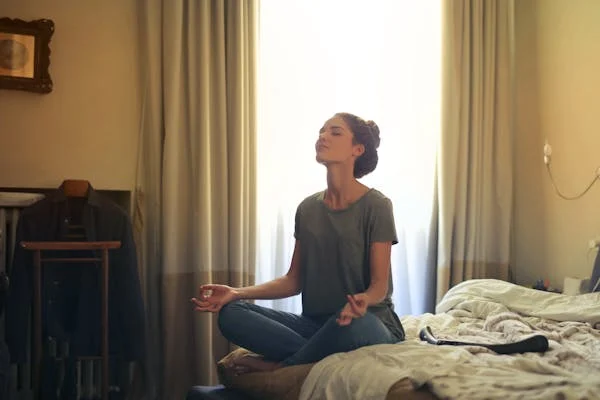Table of Contents
Introduction
In today’s world of chaos, when most times stress and anxiety are dictating our lives, getting enough sleep has become almost impossible for most people.
These sleepless nights gradually give rise to a number of health problems, from chronic fatigue and weakened immunity to depression and anxiety.
And this is where meditation for sleep-which is a mighty, natural method that calms the mind, relaxes the body, and helps one catch deep, quality sleep-comes into play.

The Link between Meditation and Sleep
First and foremost, before considering all the details of meditation for sleep, it is very important to establish the link between meditation and sleep.
Meditation, in particular mindfulness and techniques of relaxation, has been scientifically proved to decrease stress, anxiety, and tension, which are major determining factors of sleep disorders. You will manage to teach your mind not to cling to the thoughts that keep you awake through meditation.
Meditation relaxes a person and sleep follows. Meditation acts on the parasympathetic nervous system that supports the slowness of the heartbeat, lowers blood pressure, and diminishes respiration-a spontaneous process for falling asleep.
Further, meditation leads to releasing melatonin, the hormone responsible for sleep cycling, and opens the path to falling into peaceful sleep.meditation and sleep In this regard, it can be said that meditation improves falling asleep either by increasing the length or shortening the time to fall asleep.
Various scientific research has shown that meditation improves sleep quality and duration.
In a report by JAMA Internal Medicine, it was stated that participants who meditated with mindfulness were experiencing less insomnia, fatigue, and depression compared to participants without mindfulness meditation.
Further research by the National Institutes of Health has identified that meditation boosts slow-wave sleep-the deep stage of sleep that’s considered important for physical and mental restoration.
Meditation works by soothing the mind and lessening the hyperarousal so often accompanying sleeping disorders. Many people with insomnia or another sleeping disorder have an overactive mind when bedtime arrives, full of racing thoughts and worries.
Meditation quiets these thoughts and prepares the mind for a more relaxed state, in which sleep will occur.
Types of Meditation for Sleep
There is a variety of meditation for sleep that you can do as part of your bedtime routine. Each has its own specific benefits, and you can always modify them to suit your needs best and what you prefer most personally. Practice the following:
1. Mindfulness Meditation
Some very effective meditation for sleeping is mindfulness meditation. In this practice, you will place your attention on the present moment; whatever thoughts and feelings arise, you will acknowledge them without judgment.
When your mind starts to wander, gently bring your attention back to your breath or another focal point of your choosing.
How to Practice:
• Find a comfortable position in bed.
• Close your eyes and take a few deep breaths.
• Focus on your breathing, noticing the feeling of air coming inside the body and going outside.
• If thoughts come, just acknowledge them and let go of them without getting involved with them; then gently return to your breathing.
• Do this for 10-20 minutes or until you feel relaxed enough to fall asleep.
2. Guided Sleep Meditation
Guided sleep meditation is best for those who find it hard to meditate on their own or for beginners. In this kind of meditation, one listens to a recording or a meditation teacher guiding him through a set of relaxation exercises, visualizations, or affirmations meant to put him to sleep. How to Practice:
• Choose guided meditation that you relate to-many are found online.
• Lie down and get into a comfortable position, closing your eyes. • In this meditation, listen to the voice of the guide and follow his instructions to help you relax and release tension in your body and mind.
• Toward the end of this meditation, allow yourself to fall asleep naturally. 3. Body Scan Meditation
Other great ways of inducing sleep include body scan meditation, which simply works by focusing on different parts of your body, from head to toe, releasing tension that you may hold. So, how do you get it done?
You lie in bed in a comfortable position. Close your eyes and take about three deep breaths. Begin paying attention to the toes.
• Slowly shift your awareness up through your body, letting go of any tension as you go.
• By the time you reach the top of your head, your whole body should feel relaxed and ready for sleep.
4. Loving-Kindness Meditation
Loving-kindness meditation, also referred to as Metta meditation, is based on cultivating feelings of compassion and love toward oneself and then others. This type of meditation may help release negative emotions and stress that could interfere with a good night’s sleep. How to Practice:
• Sit or lie down in a comfortable position. • Close your eyes and take a few deep breaths.
• Begin with silently repeating phrases that may contain the following words: “May I be happy. May I be healthy. May I sleep peacefully.”
• As time goes by, turn these into wishes extended to other people in your life, such as loved ones, friends, and even those with whom one has adversary situations.
•.getChannel this practice further until you feel calmness and peace.
Creating a Bedtime Meditation Routine
The incorporation of meditation into one’s night routine is, therefore, very important for the realization of the benefits of meditation for sleep. The following are helpful tips that shall guide one in succeeding in creating a bedtime meditation routine:
1. Have a Consistent Bed Time
Consistency is the key to better sleep. Go to bed and wake up at precisely the same time every day, including weekends. This helps your body’s internal clock and promotes falling asleep more easily at night.
2. Create a Relaxing Environment
Your bedroom should be a sleep sanctuary. Keep your room cool, dark, and quiet, and invest in a comfortable mattress and pillows. This can also mean de-cluttering or avoiding electronic devices before bedtime to facilitate this kind of tranquil, sleep-promoting space.
3. Use Meditation in Conjunction with Other Relaxation Techniques
Consider combining meditation with other relaxations, including deep breathing, progressive muscle relaxation, or gentle yoga.
Each of these practices can be used in place of, or in addition to, meditation and could further enhance sleep when combined with the practice of meditation.
4. Be Patient and Consistent
However, this is a new habit, and just like any new habit, it will take time for its full benefits to seep into your sleep. Be patient and give yourself some time to adjust with this new habit. Consistency is the key: try meditation every night for even five or ten minutes.
Mindfulness in Sleep There is a very active action of mindfulness in both meditation and sleep. A practice of becoming more aware of thoughts, feelings, and bodily sensations puts you in a better place to identify what makes you fail to sleep well.
It is exactly what mindfulness meditation teaches: to observe your thoughts but not get hijacked by them. This is helpful at bedtime-especially when it is worries and anxieties that do the most to keep one awake.
By acknowledging such thoughts, and letting them slip by-not judged-sleep is allowed to take over.
Mindfulness also allows you to cultivate a stance of acceptance and non-reactivity, which can be very beneficial for individuals experiencing insomnia.

Rather than becoming distressed that you are not falling asleep, mindfulness invites you to acknowledge the situation without fighting it, and this may indeed make it more possible to go to sleep.
Meditation and Sleep Disorders
Meditating for sleep is especially helpful in the cases of sleep disorders: insomnia, sleep apnea, and restless leg syndrome. Meditation cannot cure these ailments. However, it can be used as an adjunct to other treatments to alleviate some of the symptoms. Instead, meditation helps to ease stress and anxiety.
Meditation for Insomnia
Sleep disorder insomnia is one of the common ones wherein there is an inability to initiate, maintain, and fall into deep sleep. Meditation helps in establishing proper sleep through the mind’s quietness, often strained by stress and anxiety, which are frequent causes of sleep disorders.
A recent study, in the journal Behavior Research and Therapy, found significant alleviation of sleep disturbances among individuals who suffer from chronic insomnia as a result of practicing mindfulness meditation. In all, those who meditated showed less nighttime wakefulness and greater overall sleep efficiency.
Meditation for Sleep Apnea
Sleep apnea is a sleep disorder involving frequent stops and starts in breathing when sleeping. Meditation, of course, cannot help to heal the physical causes of sleep apnea, but it can reduce stress and anxiety associated with this disease. In addition, relaxation techniques before bed may help an individual get better sleep.
Meditation for Restless Leg Syndrome (RLS)
Restless leg syndrome is a neurologic disorder characterized by an uncontrollable impulse to move the legs because of uncomfortable feelings.
It affects sleep onset and maintenance. Meditation can reduce the symptoms through the relaxing effect on the body and mitigation of stress, which may serve as a trigger for the condition. The Long-Term Benefits of Meditation for Sleep.
The benefits of meditation for sleep go far beyond the obvious one of improving your nighttime rest. Rather, it can have much farther-reaching effects on your general health and wellness. Some of the most critical advantages of meditation include:
1. Better Mental Health
Meditation has been proven to reduce symptoms of anxiety and depression, among other mental conditions. By promoting relaxation and reducing stress, meditation may improve mood and emotional resilience.
2. Improved Cognitive Function
Restful, good-quality sleep is vital for higher-order cognitive processes such as memory, attention, and decision-making. Enhanced sleep, as improved by meditation, contributes favorably toward cognitive functioning and results in better performance of daily activities.
3. Better Physical Health
Sleep is essential for physical health. Poor sleeping conditions have been associated with a number of health-related problems, including heart disease, obesity, and diabetes. In this respect, through meditation, improved sleep reduces the risk of developing these conditions and thus contributes to general physical health.
4. Increased Emotional Balance
Meditation has also helped further in promoting emotional balance by training the mind to watch and accept thoughts and feelings without becoming entangled with them. This could also give rise to heightened emotional stability, resilience, and, thus, improvement in relationships and quality of life overall.

Conclusion
Setting up meditation for sleep into your nightly routine can make a huge difference in your sleep problems. Be it erratic sleeplessness or a chronic sleeping disorder, meditation is an absolutely natural and effective way to soothe the mind and body and prepare both for deep and restful sleep.
Knowing the linkage between meditation and sleep, and actually practicing the different techniques of meditation as described in the above blog, will surely set the course for better sleep and overall well-being. Remember, consistency is the key.
So, continue with meditation as part of your bedtime schedule and sleep peacefully for eternity to come.
